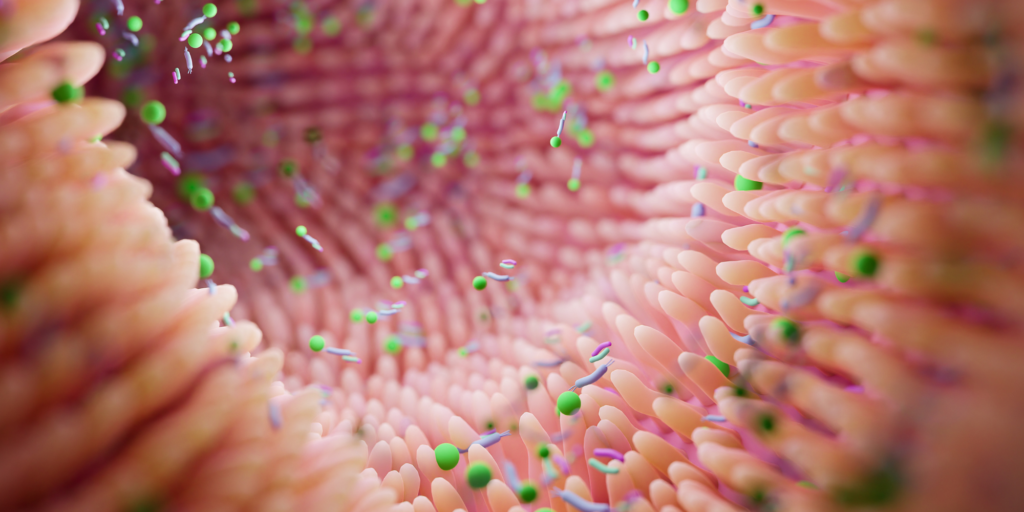In the past few years, research on the gut microbiome has exploded, and it’s made its way into everyday life. From kombucha to probiotic capsules, people are chasing the promise of “good bacteria” for better health. But what exactly is a microbiome? And why has it become such a big deal for our well-being?
In this deep dive, we ask what the gut microbiome really is, and bust a few myths along the way.
What Is the Gut Microbiome (and Why Should You Care)?
The microbiome refers to the entire collection of microorganisms like bacteria, viruses, and fungi that live in and on the human body, playing essential roles in health and disease. The gut microbiome specifically includes the microbes inhabiting your digestive system, especially along the intestinal lining.
We live in a symbiotic relationship with these microbes. For example, they help us digest otherwise indigestible plant fibers and produce short-chain fatty acids (SCFAs) that keep gut inflammation in check. But their influence goes far beyond digestion. The gut microbiome has been linked to cardiovascular health, immune responses, and even mental well-being. In rodent studies, alterations in gut bacteria compositions have been tied to changes in mood, anxiety, and stress-related disorders. Fascinatingly, certain bacterial species are more abundant in people who self-report as open and conscientious, hinting that your gut microbes might even help shape aspects of your personality.
Myth #1: Vegan and Vegetarian Diets equal Healthier Microbiomes? Not So Simple.
We often hear that a plant-based diet is the gold standard for gut health. But one of the largest studies to date, analyzing gut microbiomes of over 21,000 people, offers some nuance. The research indeed confirmed that vegans, vegetarians, and omnivores have distinctly different microbiome profiles.
Yes, plant-based diets were enriched in fiber-digesting bacteria, which is great news. But surprisingly, people on these diets had lower bacterial diversity than those on omnivorous diets. Omnivores, meanwhile, hosted bacteria that helped salvage Vitamin B12 more efficiently (a nutrient that plant-based diets often lack). On the flip side, red meat consumption was associated with bacteria linked to poorer cardiovascular outcomes.
What this means is that diet does matter, but there’s no single “perfect” microbiome, and diversity and balance are key, no matter the lifestyle you follow.
Myth #2: It’s All About What You Eat. (Spoiler: It’s Not)
Diet is only part of the picture. In a fascinating study of 1,787 people from 18 villages in Honduras, researchers found that social networks — yes, your actual human relationships — also shape your gut microbiome.
We’ve known that spouses tend to have similar gut microbes, but this study went further and showed that entire social networks share microbial strains. Interestingly, people who were more central in their social circles had microbiomes that were more similar to the wider village, while those on the social fringes had more distinct gut profiles.
At first glance, it might sound wild, but think about it. We share meals, hug, and in many cultures, greet with kisses on the cheeks. These simple interactions become pathways for microbial exchange. In fact, another study even found that the psychological pain associated with social exclusion correlates with changes in the microbiome.
So, What’s the Real Takeaway?
Your gut microbiome isn’t a simple “good vs. bad bacteria” story, and you can’t reset it overnight with a probiotic pill or a detox juice. While diet plays a major role, these studies reveal that gut health is far more complex than we’re often told. Vegans and vegetarians might have fiber-loving bacteria, but omnivores bring their own microbial perks. And believe it or not, your social life might matter just as much as your lunch plate.
Whether it’s sharing meals, hugging friends, or simply being part of a close-knit community, your gut is quietly responding, picking up bacterial strains along the way. Gut health, it turns out, is shaped by both what you eat and who you meet.
The biggest myth?
That you can control your microbiome with one magic fix.
But in reality, it’s a living, breathing ecosystem. Staying healthy means nurturing both your dietary diversity and your social connections.







